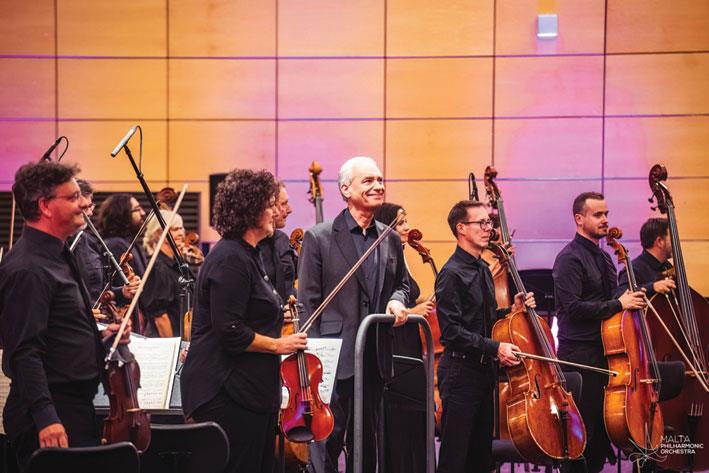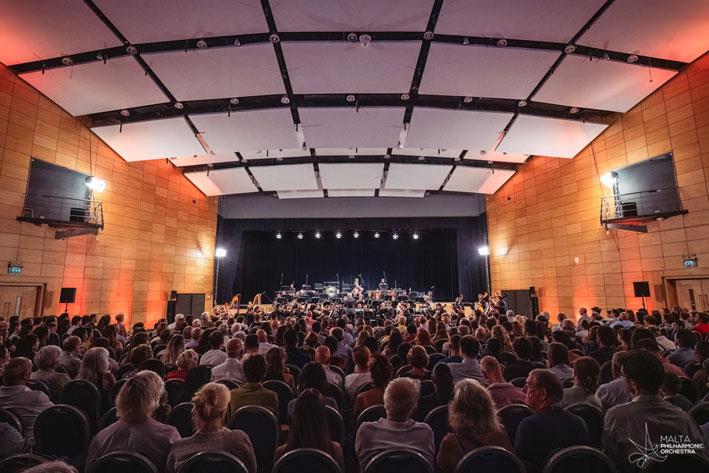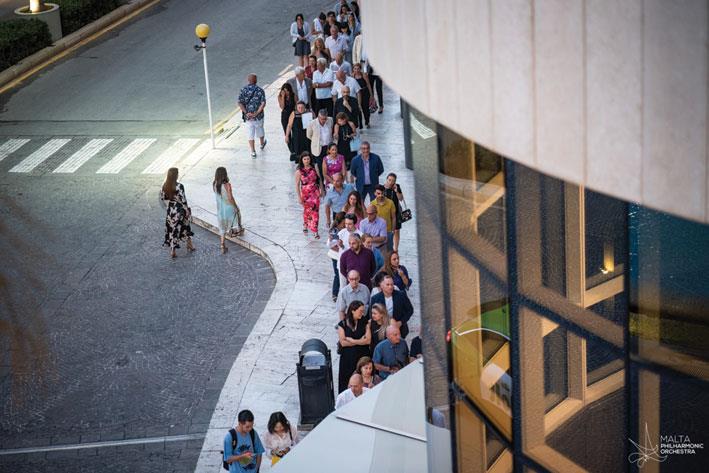I am still at a loss to quite understand how the MPO manages so many excellent performances throughout the year with what seems to me just a short break. I am looking forward to another season of good music. The Opening Concert of the coming season was held on 31st August at the Grandmaster's Suite, Hilton Malta. The queue of those who were to make up the audience was incredibly long for the multifunctional suite is huge and can accommodate some 1330 guests. It was all very well organised. It was full house but everyone was comfortably seated.
The sympathetic conducting of Maestro Michael Laus added to the enjoyment of the evening. It is evident that he is in control. One feels it. He knows every bar of the music he conducts. Unlike a couple of conductors I've seen abroad, whose body language has narrowed to a handful of restricted arm movements, Maestro Laus is very present and followed by all members of each department of the orchestra.

The evening started with Carl Maria von Weber's Overture from Der Freischütz. Opera was the family business as far as Weber was concerned, and he spent his childhood touring with the opera company that his father had set up. His opera Der Freischütz sealed his place in German musical history because of the use of folk tunes in the score.
I find this such a beautiful overture; so easy to listen to as the audience settled down. It ranks as one of my favourites even if I have never watched the actual opera. I never tire of listening to this overature and others among which Verdi's La Forza del Destino, Rossini's William Tell, Il Barbiere di Siviglia and Bizet's Carmen.

It was the one and only Tchaikovsky next. His art, his talent are so great but he does not seem to have been able to deal with his own personal problems and the ills of society of the time. How did he really die? Perhaps we shall never know the truth but he seems to have been fundamentally decent, warm-hearted and humane. Only such a person could produce such beautiful music.
If anyone was capable of producing a catchy tune then it was Tchaikovsky. Let me just mention his ballet scores which are popular to this day. Nutcracker, The Sleeping Beauty, Swanlake do not leave us in any doubt that he had massive talent for creating highly melodic pieces. His music will live forever.
That evening we heard his Orchestral Suite No. 4, Op. 61, more commonly known as Mozartiana, written in 1887 as a tribute to Wolfgang Amadeus Mozart on the 100th anniversary of that composer's opera Don Giovanni. Tchaikovsky had a great admiration for Mozart.
I enjoyed the four dainty movements. It's a wistful, nostalgic work, very much Tchaikovsky, but Mozart, too. When I was back home I played it on You Tube. How did we ever manage without it?

Last on the programme was Mussorgsky's Pictures at an Exhibition, originally composed for the piano. They were adapted and orchestrated by at least two composers but the most popular is that of Maurice Ravel, and this is the version we heard. Ravel was a master of orchestration. Pictures at An Exhibition was composed following the death of his good friend, the architect and painter Vladimir Hartmann, who died at the peak of his career at the age of 39, which had a deep effect on Mussorgsky. He was inspired by the exhibition of the artist's work which the composer had visited after the artist's death. In fact Hartmann had given Mussorgsky two of the pictures which the composer returned for the exhibition.
There is great variety in the ten pieces which have a pervading sense of nostalgia. The exhilaration of The Market at Limoges, The Great Gate of Kiev was slow and weighty, the light and amusing Ballet of the Chicks in their Shells and so on, then the majestic finale. The conductor and orchestra entered into the spirit of each piece.
Christopher Muscat, CEO of the Malta Philharmonic Orchestra and himself a composer commented: "It is indeed a pleasure to see such a good turnout and a good number of youngsters for the MPO's season opening concert. The audience witnessed an MPO in fine fettle, performing a really exciting programme under the direction of its resident conductor Michael Laus." I cannot but agree.
And now for something completely different.
Among the half a dozen or so books on my bedside table I have a very small one, of a mere 56 pages. The title is Give me the value of two bombers... and the author is Raoul Follereau. Many of you must have heard of him. Google him and you will soon find out who he was.
In the preface to the book the person who wrote it says that the amount of money Follereau raised for lepers is magnificent but "that which is lasting and durable of his work, of himself, is the example of a life entirely devoted to the cause, of the most unhappy, the most abandoned of all men... For it was Follereau who won the Battle against Leprosy." The rest is written by Follereau himself and made up of his experiences with lepers.
I wish to share the following, a story which touched me.
"A leprosy-hospital, in the most heart-breaking and odious meaning of the term - with men for whom nothing is done, and who have nothing to do - except to go round and round in their courtyard, in their cage.
They are lonely men; worse still, men who have been abandoned, and for whom there is nothing but silence and night.
Nevertheless, there is one of them - just one only - who has kept his eyes bright. He still knows how to smile, and when something is given to him to say "thank you." Just one of all these creatures has remained a man.
The Sister of Mercy wondered what was the cause of this miracle that still kept him attached to life, so she watched him. Soon she saw that every day came a face that showed itself above the wall, a wall so hard and so high. A little bit of a woman's face, no bigger than your fist; and it smiled. The man was waiting there, waiting for that smile which was the daily bread of his strength and his hope. In his turn he smiled, and then the face disappeared. And then he began his waiting once more - until the morrow.
When the sister surprised him, he said, simply. "It's my wife". Then after a silence, "Before I came here, she used to look after me in secret, and treat me with whatever she could find. A witch-doctor had provided her with an ointment, which she spread over my face every day, except for a little corner, just big enough for her to place her lips. But it was no good, and then they picked me up; but she followed me here, and when I see her, day after day, I know through her that I am still alive".
Don't underestimate the effect you have on others but I will leave you to your own interpretation.